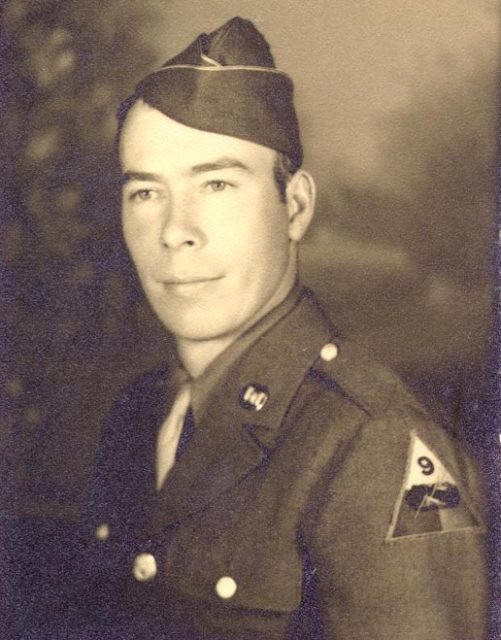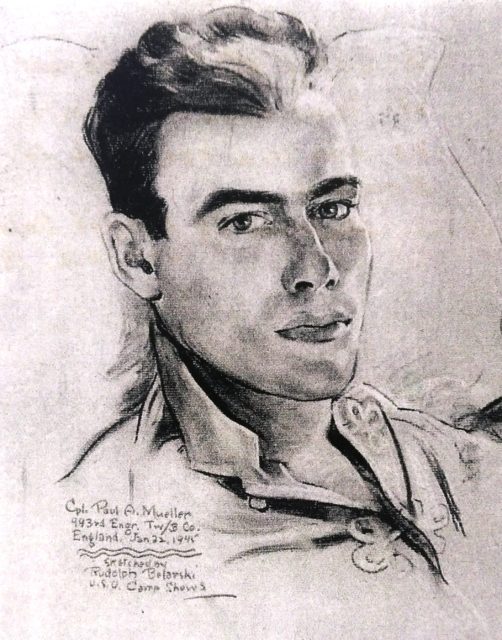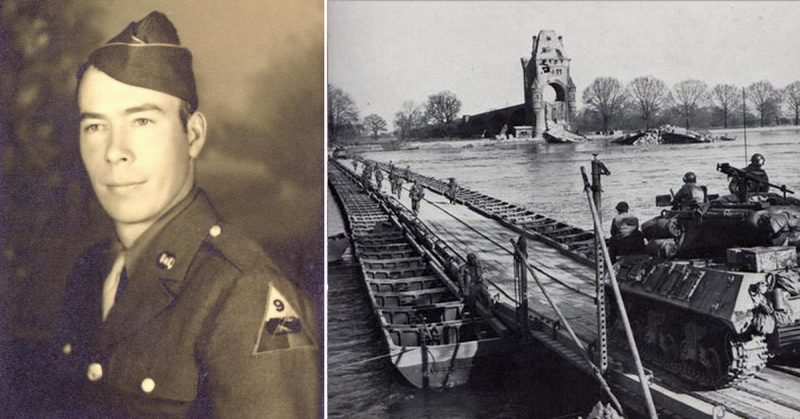War History online proudly presents this Guest Piece from Jeremy P. Ämick, who is a military historian and writes on behalf of the Silver Star Families of America.
Faye Belshe realizes all too well the sacrifices of the “Greatest Generation.” The Eldon, Mo., resident clearly recalls “all the boys” leaving home for overseas service during World War II, which included three of her brothers. Unfortunately, her family would be forced to endure an inordinate amount of sacrifice before the war ended—a reality punctuated by decades of suffering by an older brother.
“My brother Paul was seriously injured in an accident while serving in Belgium on October 5, 1944,” said Belshe. “He suffered from his injuries for the rest of his life.”
Born in Hooker, Okla., in 1917, Paul Mueller’s family later moved to Kansas where he spent many of his formative years and graduated from high school in 1934.
But it was in 1938, Belshe said, that her brother received his introduction to the military by attending Citizens’ Military Training Camp at Fort Riley, Kan.—a four-week program that provided young men with a basic military instruction without an obligation for future service.
“Our parents moved to Eldon in 1939 and Paul came to live with us for a year or two,” explained Belshe. “He then moved back to McFarland, Kan., in 1941, was married and became a father to his first child, Janice.”
However, his new domestic responsibilities would be placed on hold when Mueller was drafted into the U.S. Army in 1942 (three days prior to his daughter’s first birthday) and returned to Fort Riley, Kan., but this time for several weeks of basic training as an enlisted soldier. It was sometime during his training he was assigned to the 9th Armored Engineer Battalion of the 9th Armored Division.
Trained as a combat engineer, the soldier’s battalion was redesignated the 993rd Engineer Treadway Bridge Company after the armored divisions underwent a major reorganization and were stripped of their organic bridge companies.

Family records indicate that Mueller’s next stop in his military pilgrimage was the Desert Training Center near Needles, Calif., for desert maneuvers in early 1943. Several weeks later, he traveled to Ft. Polk, La., for swamp maneuvers, all the while learning to operate a 20-ton truck that carried the pontoons used to construct bridges for river crossings.
“Paul and his company went to Boston in May of 1944 and boarded a troop ship for England,” recalled the veteran’s sister.
An article about a reunion of 993rd Engineers appearing the August 4, 1971 edition of the New Castle News (New Castle, Pennsylvania) notes that the Mueller and his fellow engineers “arrived overseas with little time to spare, because the Normandy Invasion came June 6, 1944, and the 993rd followed the assault troops into Fortress Europe late that same month.”
The newspaper further explained that the 993rd became part of the “famed ‘rat race’ across south central France toward Germany” shortly after their arrival and spent most of their time overseas attached to the Third Army under the command of Gen. George S. Patton.
Although Mueller and his comrades learned to survive on as little as three or four hours of sleep each night before preparing for the next day’s movement, it was an event that unfolded in Belgium on the evening of October 5, 1944, that would provide him an extended—yet undesired—period of rest.
“What happened,” said Belshe, “is they were behind the front lines in Belgium and couldn’t have any lights on because it might give away their position (to the enemy). He and another soldier were sleeping in their pup tent that evening when Paul heard a truck approaching their tent.”
Solemnly, she added, “Paul sat up and that’s when this truck ran through their tent and over his mid-section, mashing his insides. The truck also ran over the head of the other soldier and killed him instantly.”

On the same day of his injury, Mueller later discovered, his younger brother, Wayne Mueller, was killed in action in Holland while serving as a paratrooper with the 101st Airborne Division.
For the next three years, Mueller was moved from one military hospital to the next, undergoing several surgeries to address his serious injuries. He received his discharge from the Army at the hospital at Ft. Bliss, Texas, in 1947 and returned to Kansas to try to rebuild his life with his wife and young daughter.
“After the war,” Belshe explained, “my brother ended up getting a job with the post office and stayed with them for 15 years. He and his wife also had two more children, both boys,” she added.
As Mueller himself explained in an article in the October 10, 1996, edition of The Signal-Enterprise newspaper (Wabaunsee County, Kan.), his years of suffering from his military injuries, combined with the loss of a brother and a friend, inspired him to find ways in which to honor their legacy.
“I try to fly our flag here at home almost every day,” wrote Mueller, “but on October 5th I fly the large flag from my brother’s casket in memory of him and my buddy.”
Corporal Paul August Mueller passed away at 86 years of age on November 30, 2003, and was laid to rest in McFarland Cemetery in Kansas. Though he and his brothers are no longer here to share recollections of their experiences, his sister has remained dedicated to the preservation of her family’s military legacy.
“Paul wore a brace on his leg his entire life after he was hurt,” Belshe said. “When he left for the service he weighed 180 pounds and he must have lost close to 100 pounds after the incident—he was nothing but skin and bones.”
Tearfully, she added, “He was one of so many that were hurt over there (in World War II) and I think his sacrifice should never be forgotten; everyone should know what all of the boys have done for them.”
